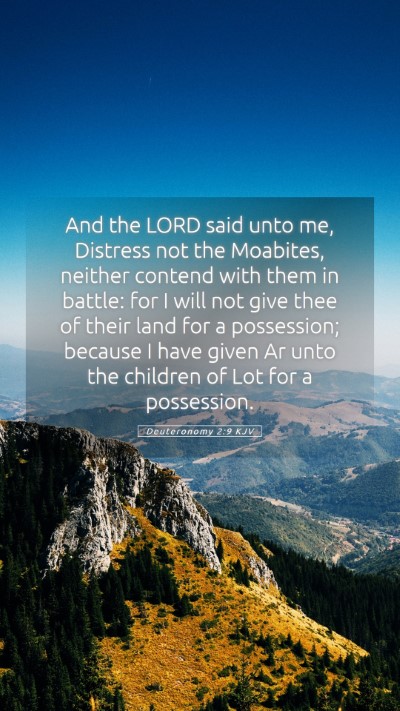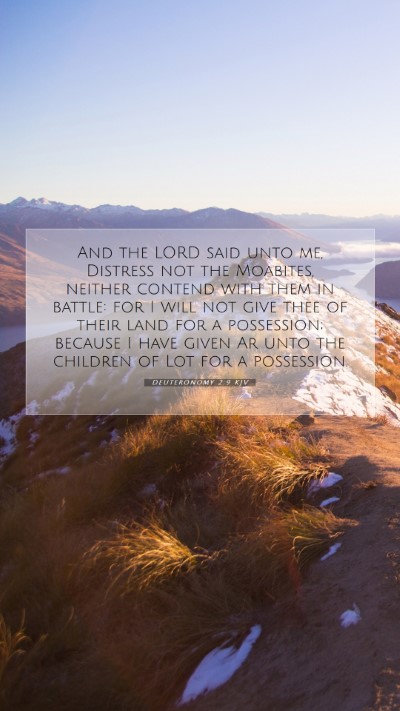Understanding Deuteronomy 2:9 - A Comprehensive Bible Verse Commentary
Bible Verse: Deuteronomy 2:9
Text: "And the Lord said unto me, Distress not the Moabites, neither contend with them in battle: for I will not give thee of their land for a possession; because I have given Ar unto the children of Lot for a possession."
Contextual Background
The passage comes in a moment of reflection for the Israelites as they approach the Promised Land. They are reminded of their journey through the wilderness and the various nations they encountered along the way. This specific verse addresses the Israelites' relationship with the Moabites, descendants of Lot, and serves a dual purpose: it highlights God's sovereignty over land and His divine instructions to His people.
Insights from Matthew Henry
Matthew Henry emphasizes God's command to the Israelites to avoid conflict with the Moabites. He points out that the Moabites, despite their distant kinship to the Israelites (being descendants of Lot), are under God’s protection at this time. Henry suggests this is a lesson in respecting God’s will regarding temporal possessions and the consequences of strife. The prohibition against engaging the Moabites is indicative of God's overarching plan for the nations and His governance over His people's interactions.
Albert Barnes' Perspective
Albert Barnes provides further commentary on the implications of this verse, stating that it illustrates the particular boundaries established by God for different nations. He notes that the children of Lot, specifically the Moabites, were allotted their territory, and thus, the Israelites were not to infringe upon this. Barnes elaborates on the historical significance of Moab, detailing its status as a nation that, although at odds with Israel in later biblical narratives, was to be respected during this phase of Israel's journey.
Adam Clarke's Analysis
Adam Clarke gives attention to the geographic and political context of the Moabites. He asserts that their land had been specifically designated by God for them, and there was no cause for contention. Clarke notes that understanding the historical context of the land, along with God’s directives, is critical for grasping the full meaning of this scripture. He highlights the need for the Israelites to recognize God's authority in granting land and to maintain peace with neighboring nations.
Theological Significance
This verse encourages readers to reflect on the themes of divine command, respect for boundaries set by God, and the relationship between nations. Here are a few key takeaways:
- Divine Authority: The reminder that God has authority over all lands and nations.
- God's Protection: Acknowledges God's protection over specific groups during certain periods.
- Peaceful Intent: Encourages the pursuit of peaceful relationships rather than conflict.
Cross References
For a deeper understanding of God’s directives and the interactions between nations, consider these related verses:
- Numbers 20:14-21: Israel's approach to Edom, a brother nation of Moab.
- Psalm 60:8: A mention of Moab as a significant entity relating to Israel.
- Jeremiah 48: Prophecies concerning the fate of Moab.
Practical Applications
This verse provides rich material for bible study insights and bible verse interpretations. Here are a few areas for reflection:
- Respect for Others: How can we apply the principle of respecting others' territories in our daily lives?
- God's Plan: Reflect on the understanding that God has a plan for each nation and individual.
- Conflict Resolution: Engage in peaceful resolutions where possible rather than seeking conflict.
Conclusion
Deuteronomy 2:9 serves as a poignant reminder of God's control over nations and His will for peace. For anyone looking into bible verse explanations and seeking to deepen their bible study understanding, this verse illustrates fundamental principles of respecting divine direction and the significance of maintaining peace with neighbors. Engaging with this verse can promote discussions in bible study groups or be a topic for online bible study sessions.
As you reflect upon this verse, consider how God's directives in Scripture can apply to your daily interactions and understanding of His overarching plan.


